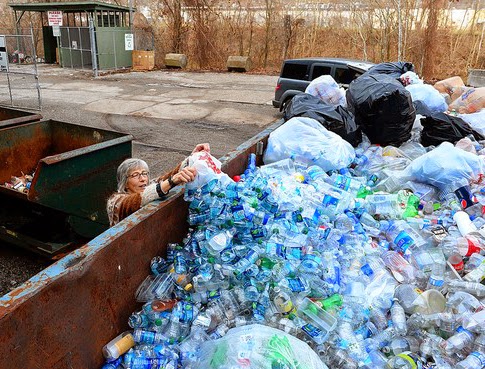 |
| Recycling bottles during West Virginia spill. Photo: Chip Ellis, The Charleston Gazette |
Only 36 percent of West Virginia residents have curbside recycling, and in 2011 the Charleston area recycled less than 1 percent of its eligible plastic, compared to 30 percent nationally. "Many small towns and rural counties struggle to offer recycling services, especially with tight government budgets, limited access to recycling processors and wide fluctuation in the market for recyclable materials," Bauerlein writes. "Only half the population of Mississippi has access to drop-off or curbside programs. Some small cities, such as Lynn Haven, Fla., eliminated recycling programs because there were no nearby processing centers." (WSJ graphic)
 The main reason rural areas lack access to recycling is that dumping trash is quicker and easier than recycling. "Shawn Lindsey, a recycling expert who advises the not-for-profit Center for Rural Strategies, said some towns cannot get vendors to bring in recycling containers because it takes weeks to fill a bin, tying up a company asset and providing an insufficient return," Bauerlein writes. Meanwhile, Lindsey said dumping trash in a place like Athens, Tenn., where he works, costs about $20 a ton, while it can cost more than $100 a ton in some urban areas.
The main reason rural areas lack access to recycling is that dumping trash is quicker and easier than recycling. "Shawn Lindsey, a recycling expert who advises the not-for-profit Center for Rural Strategies, said some towns cannot get vendors to bring in recycling containers because it takes weeks to fill a bin, tying up a company asset and providing an insufficient return," Bauerlein writes. Meanwhile, Lindsey said dumping trash in a place like Athens, Tenn., where he works, costs about $20 a ton, while it can cost more than $100 a ton in some urban areas.Some people are optimistic that rural recycling has a bright future, with technological advances like automated bin-lifting trucks and optical sorters that will make it cheaper, Bauerlein writes. Mississippi was recently "awarded $1 million in grants to four communities seeking to build 'hub-and-spoke' networks, which could pool their collection to make recycling financially viable, according to the Mississippi Department of Environmental Quality." But the best solution, advocates say, is to make recycling free and easy for everyone. (Read more)
No comments:
Post a Comment